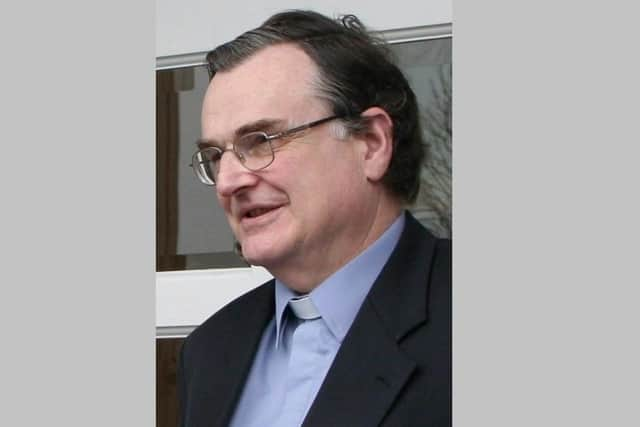Canon Ian Ellis: Church leaders call for an end to the violence in Colombia


Usuga was taken in the course of the Osiris operation, in which one police officer was killed.
However momentous the development was, Colombia Risk Analysis director Sergio Guzman was subsequently reported by Reuters as saying that a new leader would surely be waiting to take over from Usuga whose capture would not change the fundamentals of drug trafficking.
Advertisement
Hide AdAdvertisement
Hide AdThe news agency also reported that Usuga was “the leader of the drug trafficking group the Clan del Golfo, or Gulf Clan, following stints as a left-wing guerrilla and later as a paramilitary”. The scale of the drugs problem was underscored by a recent UN report indicating that “potential production of pure cocaine hydrochloride was estimated at 1,228 metric tons in 2020” in Colombia.


The narcotics trade is a tragic blight on society and the extent of concern is clear when one considers that the Colombian government had offered 3bn pesos (almost £600,000) for information about where Usuga could be found, with the US government having offered $5m for the same.
The people of Colombia have suffered much violence over drugs trafficking and in the decades-long conflict with the outlawed Revolutionary Armed Forces of Colombia (FARC).
For example, in 2003 Ecumenical News International’s New York-based Chris Herlinger reported that FARC, which had been labelled terrorist by Washington, had for years been attacking a 500-mile pipeline in Arauca, in eastern Colombia, used for US-bound oil and had recently stepped up its campaign with “periods of daily bombing”. After mass protests against illegal groups in 2008, a peace process lead to a government deal with FARC in 2016.
Advertisement
Hide AdAdvertisement
Hide AdThe then President, Juan Manuel Santos, was awarded a Nobel Peace Prize “for his resolute efforts to bring the country’s more than 50-year-long civil war to an end, a war that has cost the lives of at least 220,000 Colombians and displaced close to six million people”, according to the citation.
In fact, a first text of the agreement had been put to the people of Colombia in a 2016 referendum but had just failed to reach popular approval with 50.2% of votes against. In response to this narrow defeat, the Colombian government and FARC quickly agreed a revised accord which was endorsed by both Houses of the Congress of Colombia in the following month.
President Santos was succeeded by President Duque in 2018.
However, as recently as November 6 in the journal Foreign Policy, Colombia-based journalist Megan Janetsky reported the peace accords as crumbling, stating: “A right-wing Colombian government that campaigned against the peace pact, saying it was too lenient on guerrillas for their crimes, has failed to implement key parts of the accords, such as rural development and establishing state presence in zones once controlled by the FARC. A smattering of armed groups has fought for control of those areas, spurring new waves of violence.”
Reflecting on the Colombian peace agreement’s fifth anniversary on November 24 this year, ABColombia, a group of leading UK and Irish organisations with programmes in Colombia — including Christian Aid, Oxfam and Trócaire (the overseas development agency of the Roman Catholic Church in Ireland) – issued a statement indicating that while Colombian civil society continues to demonstrate its support for the transition to peace, “there are serious concerns about the delay in implementing fundamental points of the agreement, serious violations of human rights and a deterioration in the humanitarian situation in the rural regions”.
Advertisement
Hide AdAdvertisement
Hide AdCalling for the full implementation of the peace accord, the ABColombia group states that since the signing of the peace agreement, “292 former combatants in the process of reincorporation and 594 human rights defenders have been killed”, pointing out that in many cases they had been working to build peace and implement the accord.
The group adds that the “violent repression of the public protests in 2020 and 2021 indicates a military (rather than civil) response by both the government and state security forces to social protest”.
Earlier this year the Colombian people took to protesting, mainly over proposed tax reforms. The protests turned violent.
According to a BBC report, the proposal would have lowered the threshold at which salaries are taxed, affecting anyone with a monthly income of 2.6m pesos (£493) or more and would also have eliminated many of the current exemptions enjoyed by individuals, as well as increasing taxes imposed on businesses.
Advertisement
Hide AdAdvertisement
Hide AdLast May, an international group of church leaders called for an end to the spiral of violence in which 40 people had been killed, many others had gone missing and thousands were injured “as a result of the security response”, the Anglican Communion News Service reported.
The signatories of the church leaders’ statement included the secretary-general of the Anglican Communion and the general-secretaries of the World Communion of Reformed Churches, the Lutheran World Federation and the World Methodist Council, and the President of the Latin American Roman Catholic Episcopal Council.
It is good that churches and charities are following the Colombian situation so closely.
• Canon Ian Ellis is a former editor of The Church of Ireland Gazette
——— ———
A message from the Editor:
Advertisement
Hide AdAdvertisement
Hide AdThank you for reading this story on our website. While I have your attention, I also have an important request to make of you.
With the coronavirus lockdowns having had a major impact on many of our advertisers — and consequently the revenue we receive — we are more reliant than ever on you taking out a digital subscription.
Subscribe to newsletter.co.uk and enjoy unlimited access to the best Northern Ireland and UK news and information online and on our app. With a digital subscription, you can read more than 5 articles, see fewer ads, enjoy faster load times, and get access to exclusive newsletters and content.
Visit
now to sign up.
Our journalism costs money and we rely on advertising, print and digital revenues to help to support them. By supporting us, we are able to support you in providing trusted, fact-checked content for this website.
Ben Lowry, Editor